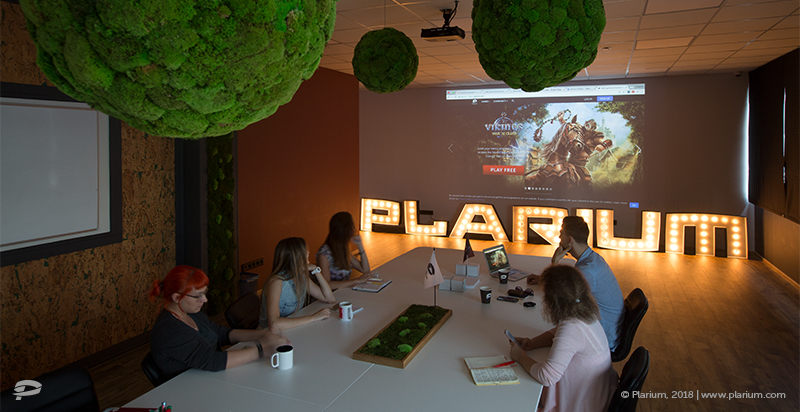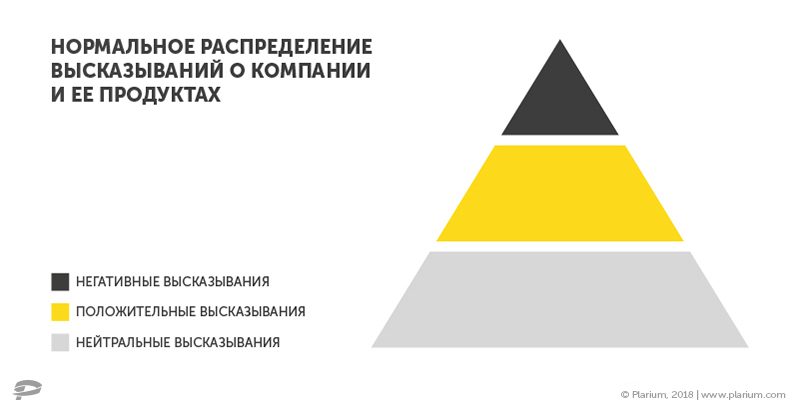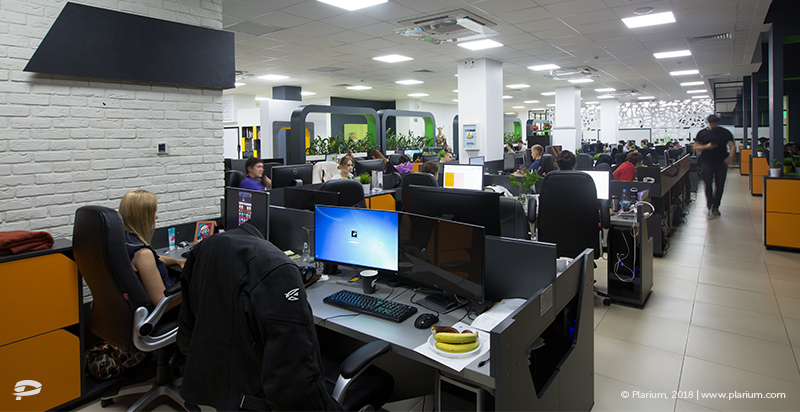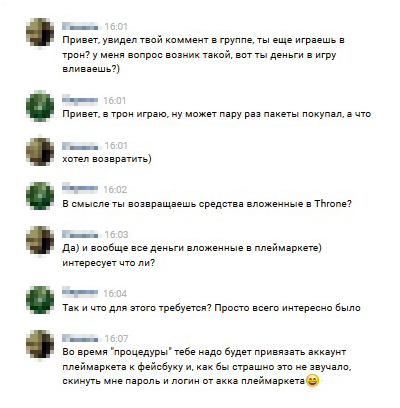Why pay a rep manager
Sales on the Internet are sales based on trust. The IT industry is no exception: the user looks at the photos, studies the characteristics of the product, payment terms and, most importantly, reviews from other customers. It is the opinion of people that becomes a decisive factor and helps to make the final choice among many proposals.
Obviously, in conditions of high competition, reputation is one of the most important assets of the company. Experts from the Plarium Krasnodar studio will tell you how to protect her and whom to entrust such a responsible business.

Many believe that it’s enough to run ads, create your own website or accounts in social networks - and the target audience will find out about their company. And only the good will know. Typically, executives who hold such views can place the responsibility for reputation on SMM and PR managers or even their secretary. However, everything is not so simple.
Being in the global network means being at risk. Any information that gets on the Internet overnight becomes the property of the general public, which forms the idea of you as a bona fide (or not so) producer. In game development, and in any other field, procrastination is an impermissible luxury, so it is better to protect yourself and isolate the wiring, trusting competent specialists, and not wait for the fire.

Who is the online reputation manager (ORM), on whose shoulders lies such a serious task? What does he do and what secret knowledge does he have? The first and most obvious function is to track all references to the company and its products, as well as maintain a positive image.
This requires unconditional technical literacy and analytical skills. In addition, a reputation manager should:
Getting started, first of all, it should be understood that a “healthy” information field is a lot of references of a different nature. Neutral statements that contribute to the popularity of the project should prevail: if a large number of reviews and reviews are published on the network, then there is the opportunity to learn about the product. At the second stage - positive comments and recommendations for other users, and at the third - a small dissemination of negativity.

The latter is important, since in the complete absence of negative comments, it seems that the company has “cleaned up” something. Certain product characteristics may not suit one person and like another, so there are always such comments. In addition, according to statistics, people are more likely to leave feedback in a negative emotional outburst: in case of malfunctions and malfunctions, they write much more often than when everything is functioning correctly.
It is important to understand that even a negative reaction indicates a concern for the project, and is also a valuable resource for the company. It is necessary to listen to users and implement their proposals, if balance allows. It should be borne in mind that reviews and suggestions are conflicting. So, in our gaming communities, some subscribers ask for respite from endless battles, while others write: "We want to fight more, let us all fight." In such situations, we try to keep in mind the difference in the gaming experience (that death is new for the newcomer, joy is for the experienced one) and a general trend is drawn.
The search and processing of information, as well as for rapid response requires a lot of time and effort. An ORM specialist will not be able to fully cover the Web space with the speed of a machine algorithm, which reveals about 80% of references to the company and its products. Programs like Brand Analytics, YouScan or SemanticForce are great for monitoring. You can also use the free Google Alerts tool to keep up to date with the latest indexed resources.

Programs aggregate a huge amount of data and in addition help to obtain additional information about the audience and sites. However, they often fail to appreciate the tonality of the messages: they do not recognize ironic or comic remarks and define some words as negative, although these are neutral references in the general style of the project. Such negative terms as “threat”, “war”, “defense”, “formidable Vikings”, “get ready to fight” can be considered negative. All of them are characteristic for the setting of our game Vikings: War of Clans.
Analytical tools should be correctly implemented in the work, taking into account their advantages and disadvantages. That is why we, firstly, manually monitor the search engines (evaluate the issuance of the most popular queries about our projects and the studio) and markets (check large sites for communication with users and receiving feedback). Secondly, we collect mentions on social networks (VK, Instagram, Facebook, Twitter, YouTube) and on third-party blogs and sites.
The most important thing at this stage is to work out all potential sources of information: social networks, forums, blogs, video services, otzovik sites. And of course, keep your finger on the pulse.
To ensure effective protection of reputation, it is not enough just to quickly collect data - before deciding on a reaction, mentions must be typed.
Basically, ORM specialists work with constructive and non-constructive negative comments. The first are comments and suggestions that can be transferred to other departments for further consideration. We take them into service, and we thank and encourage the authors for their desire to make our projects better.
Non-constructive comments are divided into several subtypes:
In all three cases, brand advocates and loyal users often come to the rescue, drawing attention to the benefits of the project.
An ORM specialist is a guru of revealing hidden and not very hidden threats. Copyright protection, protection from fraudsters and information leakage is provided by a number of departments, but often it is the reputation managers who are the first to sound the alarm.
There are times when unscrupulous development companies copy interface elements (icons, their location) or design and content in full. If you find a copyright violation, you must immediately contact Google Play and the App Store so that the company’s account is blocked without the right to recovery. Intellectual property is strictly guarded: judging by our experience, markets always meet and the issue is resolved in favor of the affected party.

In social networks and on various sites, users are sometimes offered to provide their username and password or install software in order to return the money invested in the game or get some advantages. This serves someone else's commercial gain: personal data is stolen, and the device is infected with viruses. Such pages can be blocked by contacting hosting providers or the technical support service of social networks, and if the information appears inside the game or on official resources, you must immediately block the scam accounts and delete their messages.

In a highly competitive environment, leakage can result in serious financial loss. Remember the rule of three seconds: that which lasted at least three seconds on the Web is scanned, copied and already spread.
Sources of intentional and unintentional leaks:
In the field of innovation, where it is important to be proactive, serious protection mechanisms are needed. The ORM specialist, in turn, tries to detect leaks in time and respond quickly to them.
Today, the information field around the product is no less important than the product itself, and reviews on the Web are more significant than the ratings of official sources. The tasks of a reputation manager are high-quality analytics, quick detection and elimination of threats, as well as maintaining the loyalty of the target audience. Do you have an ORM specialist in your company?
Obviously, in conditions of high competition, reputation is one of the most important assets of the company. Experts from the Plarium Krasnodar studio will tell you how to protect her and whom to entrust such a responsible business.

Global Network Risks
Many believe that it’s enough to run ads, create your own website or accounts in social networks - and the target audience will find out about their company. And only the good will know. Typically, executives who hold such views can place the responsibility for reputation on SMM and PR managers or even their secretary. However, everything is not so simple.
Being in the global network means being at risk. Any information that gets on the Internet overnight becomes the property of the general public, which forms the idea of you as a bona fide (or not so) producer. In game development, and in any other field, procrastination is an impermissible luxury, so it is better to protect yourself and isolate the wiring, trusting competent specialists, and not wait for the fire.

Competencies of an ORM specialist
Who is the online reputation manager (ORM), on whose shoulders lies such a serious task? What does he do and what secret knowledge does he have? The first and most obvious function is to track all references to the company and its products, as well as maintain a positive image.
This requires unconditional technical literacy and analytical skills. In addition, a reputation manager should:
- proficient in monitoring tools;
- distinguish between types of negative references and methods for their processing;
- have the skills of a diplomat, be able to localize and resolve conflicts;
- navigate the national and international legislation, understand what laws can be applied in a given situation;
- provide technical support to users if necessary.
Analytics mentions
Pyramid rule
Getting started, first of all, it should be understood that a “healthy” information field is a lot of references of a different nature. Neutral statements that contribute to the popularity of the project should prevail: if a large number of reviews and reviews are published on the network, then there is the opportunity to learn about the product. At the second stage - positive comments and recommendations for other users, and at the third - a small dissemination of negativity.

The latter is important, since in the complete absence of negative comments, it seems that the company has “cleaned up” something. Certain product characteristics may not suit one person and like another, so there are always such comments. In addition, according to statistics, people are more likely to leave feedback in a negative emotional outburst: in case of malfunctions and malfunctions, they write much more often than when everything is functioning correctly.
It is important to understand that even a negative reaction indicates a concern for the project, and is also a valuable resource for the company. It is necessary to listen to users and implement their proposals, if balance allows. It should be borne in mind that reviews and suggestions are conflicting. So, in our gaming communities, some subscribers ask for respite from endless battles, while others write: "We want to fight more, let us all fight." In such situations, we try to keep in mind the difference in the gaming experience (that death is new for the newcomer, joy is for the experienced one) and a general trend is drawn.
Monitoring
The search and processing of information, as well as for rapid response requires a lot of time and effort. An ORM specialist will not be able to fully cover the Web space with the speed of a machine algorithm, which reveals about 80% of references to the company and its products. Programs like Brand Analytics, YouScan or SemanticForce are great for monitoring. You can also use the free Google Alerts tool to keep up to date with the latest indexed resources.

Programs aggregate a huge amount of data and in addition help to obtain additional information about the audience and sites. However, they often fail to appreciate the tonality of the messages: they do not recognize ironic or comic remarks and define some words as negative, although these are neutral references in the general style of the project. Such negative terms as “threat”, “war”, “defense”, “formidable Vikings”, “get ready to fight” can be considered negative. All of them are characteristic for the setting of our game Vikings: War of Clans.
Analytical tools should be correctly implemented in the work, taking into account their advantages and disadvantages. That is why we, firstly, manually monitor the search engines (evaluate the issuance of the most popular queries about our projects and the studio) and markets (check large sites for communication with users and receiving feedback). Secondly, we collect mentions on social networks (VK, Instagram, Facebook, Twitter, YouTube) and on third-party blogs and sites.
The most important thing at this stage is to work out all potential sources of information: social networks, forums, blogs, video services, otzovik sites. And of course, keep your finger on the pulse.
Typing and Response
To ensure effective protection of reputation, it is not enough just to quickly collect data - before deciding on a reaction, mentions must be typed.
Basically, ORM specialists work with constructive and non-constructive negative comments. The first are comments and suggestions that can be transferred to other departments for further consideration. We take them into service, and we thank and encourage the authors for their desire to make our projects better.
Non-constructive comments are divided into several subtypes:
- Emotional negative: dissatisfied players want to express everything that is boiling, and get feedback from company employees with a promise to understand the situation.
- Trolling: causeless attacks that are not worth responding to, as any attempt at dialogue will be the reason for new accusations.
- Black PR from competitors who seek to spoil your reputation and disseminate negative reviews from third-party accounts (you can indicate positive qualities of the product or ask for a more detailed description of the problem).
In all three cases, brand advocates and loyal users often come to the rescue, drawing attention to the benefits of the project.
Other reputation threats
An ORM specialist is a guru of revealing hidden and not very hidden threats. Copyright protection, protection from fraudsters and information leakage is provided by a number of departments, but often it is the reputation managers who are the first to sound the alarm.
Copyright
There are times when unscrupulous development companies copy interface elements (icons, their location) or design and content in full. If you find a copyright violation, you must immediately contact Google Play and the App Store so that the company’s account is blocked without the right to recovery. Intellectual property is strictly guarded: judging by our experience, markets always meet and the issue is resolved in favor of the affected party.

Scammers
In social networks and on various sites, users are sometimes offered to provide their username and password or install software in order to return the money invested in the game or get some advantages. This serves someone else's commercial gain: personal data is stolen, and the device is infected with viruses. Such pages can be blocked by contacting hosting providers or the technical support service of social networks, and if the information appears inside the game or on official resources, you must immediately block the scam accounts and delete their messages.

Information leak
In a highly competitive environment, leakage can result in serious financial loss. Remember the rule of three seconds: that which lasted at least three seconds on the Web is scanned, copied and already spread.
Sources of intentional and unintentional leaks:
- employees (publishing photos from private presentations, revelations in a friendly conversation);
- partners (publishing photos from private events, occasional references to internal business processes);
- competitors (targeted insider trading).
In the field of innovation, where it is important to be proactive, serious protection mechanisms are needed. The ORM specialist, in turn, tries to detect leaks in time and respond quickly to them.
To summarize
Today, the information field around the product is no less important than the product itself, and reviews on the Web are more significant than the ratings of official sources. The tasks of a reputation manager are high-quality analytics, quick detection and elimination of threats, as well as maintaining the loyalty of the target audience. Do you have an ORM specialist in your company?
